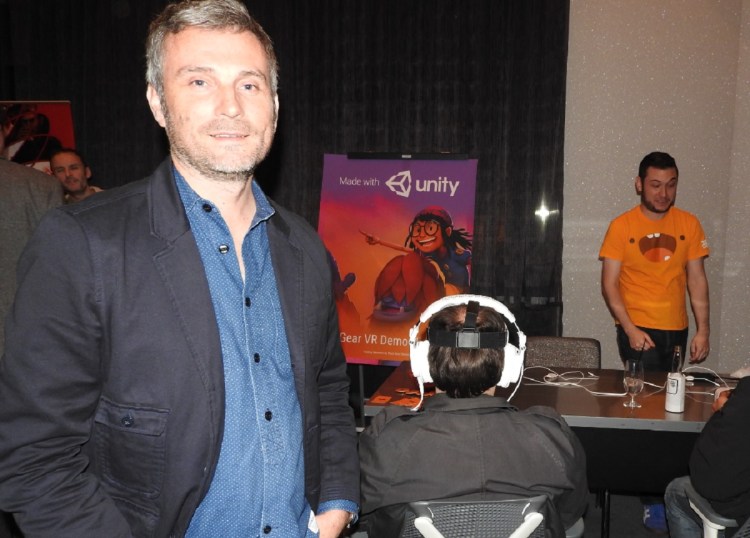Virtual reality is invigorating startup economies around the globe. Unity Technologies, the San Francisco-based maker of the Unity game engine, wants to fuel those VR startups by making its engine ideal for those games and apps. More than 2 million developers are using the Unity engine, and their games are being downloaded 1.2 billion times a month. That’s a huge amount of activity, and lately, much of it has been focused on VR, which is expected to become a $30 billion industry by 2020, according to tech advisor Digi-Capital.
Clive Downie, chief marketing officer at Unity Technologies, gets to see a ton of these demos. While places like Los Angeles and Silicon Valley are strong in VR, he says that virtual reality startups are sprouting in every corner of the globe.
I caught up with Downie at a Unity press event that showed off a number of VR game developers who are using the Unity engine to make Samsung Gear VR titles. Here’s an edited transcript of our conversation.
GamesBeat: How much have you invested in VR?
Clive Downie: We hope we’ve done a good job of investing in the tools that will empower people’s creativity as they start exploring this new platform. We’ve spent more than a year investing in this aspect of Unity. You can see here the power of creativity in the hands of a global set of developers.
We’re happy with where it’s going. We’re happy with the results on the Gear VR app store. Just after launch, 88 percent of the apps there were made with Unity. That, for us, is a great reflection of the investment we’re making in Unity and VR.
GamesBeat: Do you know how many VR games based in Unity are available now?
Downie: I don’t know that specifically. But of course in the background — because of the investment, we have people who are putting time into the Rift, PlayStation VR, HoloLens.
What Gear VR represents is the value proposition. You have people with what’s arguably the largest mobile phone format. There will only be greater accessibility for Android devices in the future. It provides them the opportunity to experience VR for $99. You’ve seen what makes successful platforms. It’s credible content and a credible value proposition.
This is the tip of the iceberg as far as credible content, which Unity is powering. The hardware represents a credible value proposition because of its price point and the experience it can power.
GamesBeat: I played the dev version with a Galaxy Note. The new phones seem to make a very big difference in quality. They’ve made a very big leap in a short time, from things that look more amateurish to things that look like real games.
Downie: There’s always evolution. We’re excited about equipping the pioneers with the tools they need for their adventure. These are version 1.0s. Good on these developers for taking a stand and using Unity to get the 1.0 product out, because you know they’re going to continue to evaluate what went wrong and iterate on what went right. Two to three years down the line, on new versions of Gear VR and other VR headsets, these developers will have the head start.
I remember the head start we got at ngmoco in 2007, making mobile games. You look at the learning we had through subsequent versions of products. When other people were coming into the growing market, you could see them making the same mistakes we’d made two, three, four years before. It’s a credit to this room and their peers in the VR space who are going to wake up in about three years’ time and be grateful they got in on the ground floor. They’ll be the leaders in the space. They’ll have made the mistakes you need to make to get to excellence.
GamesBeat: What sort of variety of things are people picking Unity for? They wouldn’t necessarily use it for photos or music.
Downie: The majority of 360 video experiences use Unity. Many of the shops have Unity in their tech stack because the Unity player is so adept at importing the video files and outputting them in 360. We’re fortunate in that respect, that we’re applicable to video. We’re obviously applicable for creating 3D environments. We saw it and we’ve been investing in it.
GamesBeat: What changes did you have to make to your toolset? Would you consider it a big investment?
Downie: It’s a big investment and it’s ongoing. We have great partners in all the hardware companies helping us understand what they’re doing and how we need to react. That’s a benefit for Unity.
Our primary benefit, of course, is the size and reach of our developer ecosystem. When you think about launching new platforms, you want developers to create for those platforms. Unity provides that opportunity.
GamesBeat: Are there any games that are standing out as hits yet?
Downie: I think it’s too early. It’ll take a bigger installed base of hardware to do that, supply keeping up with demand. A few of the products here are doing well. Mr. Riccitiello’s been on that over there for at least 25 minutes. That’s not a bad sign. I’ve seen him play games for 30 seconds and walk away.


